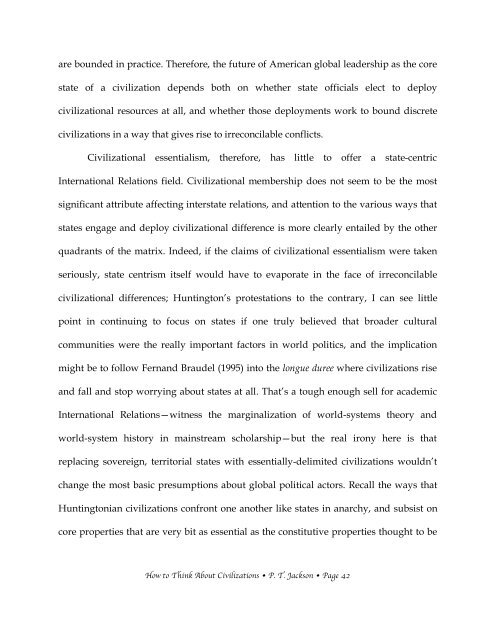How to Think About Civilizations - The Watson Institute for ...
How to Think About Civilizations - The Watson Institute for ...
How to Think About Civilizations - The Watson Institute for ...
Create successful ePaper yourself
Turn your PDF publications into a flip-book with our unique Google optimized e-Paper software.
are bounded in practice. <strong>The</strong>re<strong>for</strong>e, the future of American global leadership as the core<br />
state of a civilization depends both on whether state officials elect <strong>to</strong> deploy<br />
civilizational resources at all, and whether those deployments work <strong>to</strong> bound discrete<br />
civilizations in a way that gives rise <strong>to</strong> irreconcilable conflicts.<br />
Civilizational essentialism, there<strong>for</strong>e, has little <strong>to</strong> offer a state-centric<br />
International Relations field. Civilizational membership does not seem <strong>to</strong> be the most<br />
significant attribute affecting interstate relations, and attention <strong>to</strong> the various ways that<br />
states engage and deploy civilizational difference is more clearly entailed by the other<br />
quadrants of the matrix. Indeed, if the claims of civilizational essentialism were taken<br />
seriously, state centrism itself would have <strong>to</strong> evaporate in the face of irreconcilable<br />
civilizational differences; Hunting<strong>to</strong>n’s protestations <strong>to</strong> the contrary, I can see little<br />
point in continuing <strong>to</strong> focus on states if one truly believed that broader cultural<br />
communities were the really important fac<strong>to</strong>rs in world politics, and the implication<br />
might be <strong>to</strong> follow Fernand Braudel (1995) in<strong>to</strong> the longue duree where civilizations rise<br />
and fall and s<strong>to</strong>p worrying about states at all. That’s a <strong>to</strong>ugh enough sell <strong>for</strong> academic<br />
International Relations—witness the marginalization of world-systems theory and<br />
world-system his<strong>to</strong>ry in mainstream scholarship—but the real irony here is that<br />
replacing sovereign, terri<strong>to</strong>rial states with essentially-delimited civilizations wouldn’t<br />
change the most basic presumptions about global political ac<strong>to</strong>rs. Recall the ways that<br />
Hunting<strong>to</strong>nian civilizations confront one another like states in anarchy, and subsist on<br />
core properties that are very bit as essential as the constitutive properties thought <strong>to</strong> be<br />
<strong>How</strong> <strong>to</strong> <strong>Think</strong> <strong>About</strong> <strong>Civilizations</strong> • P. T. Jackson • Page 42
















